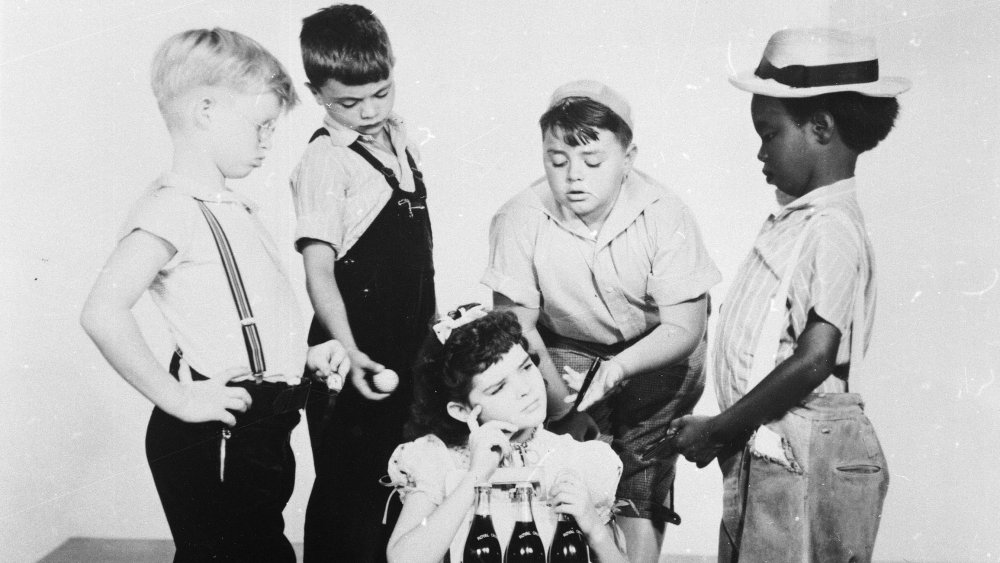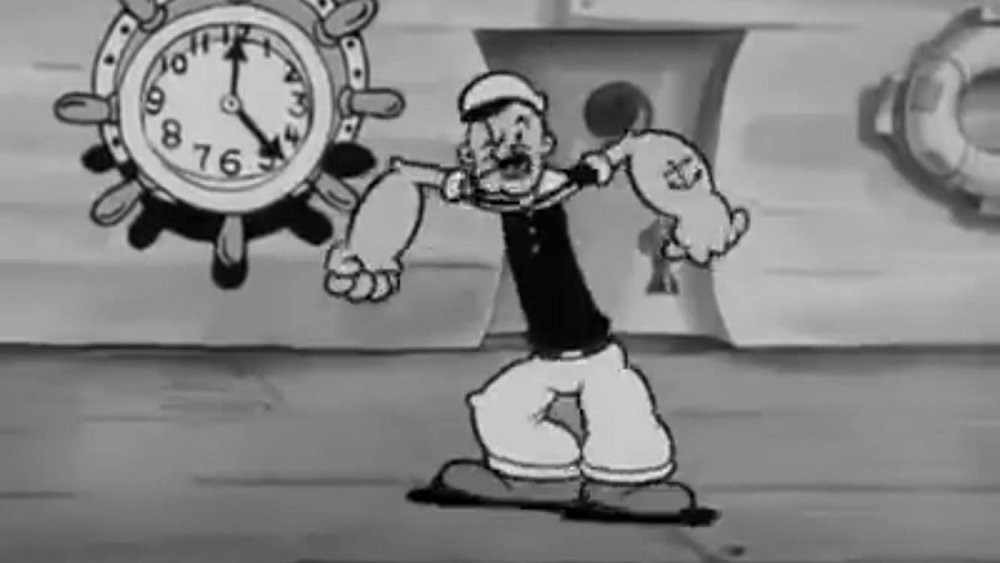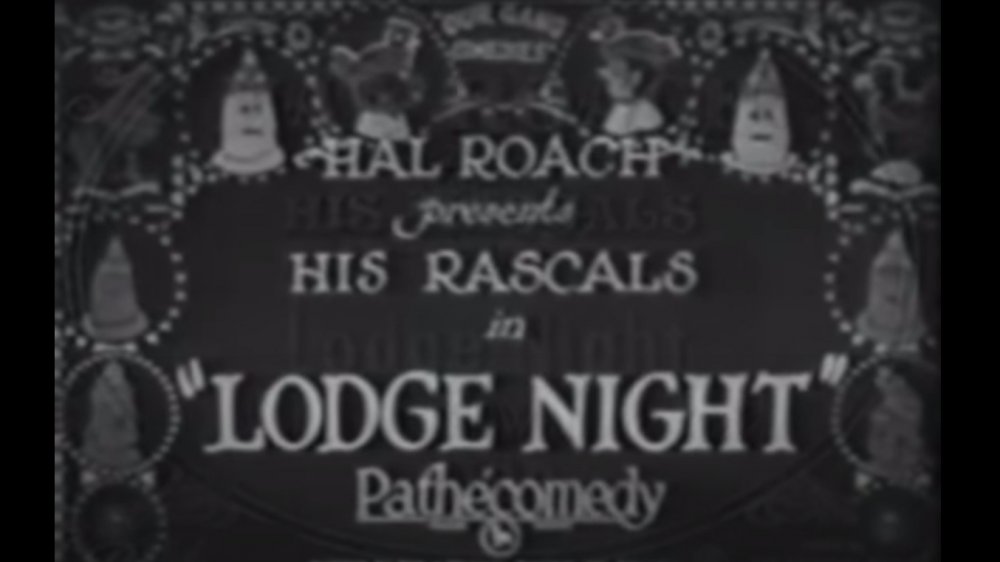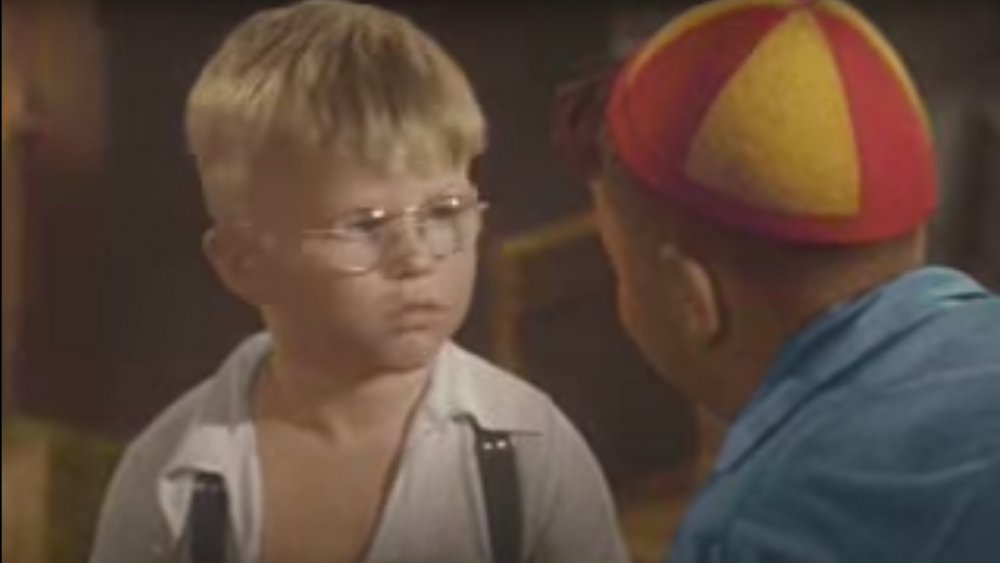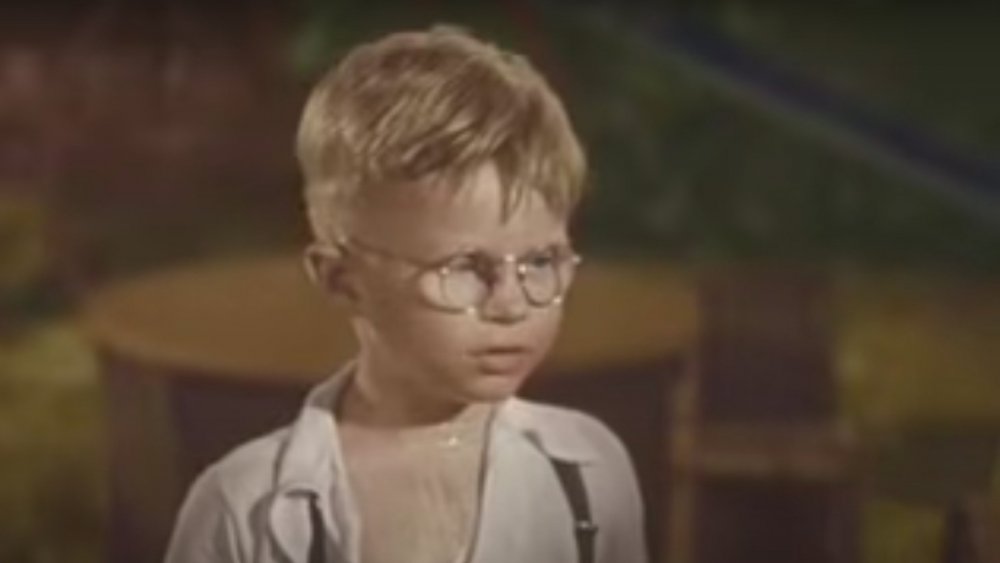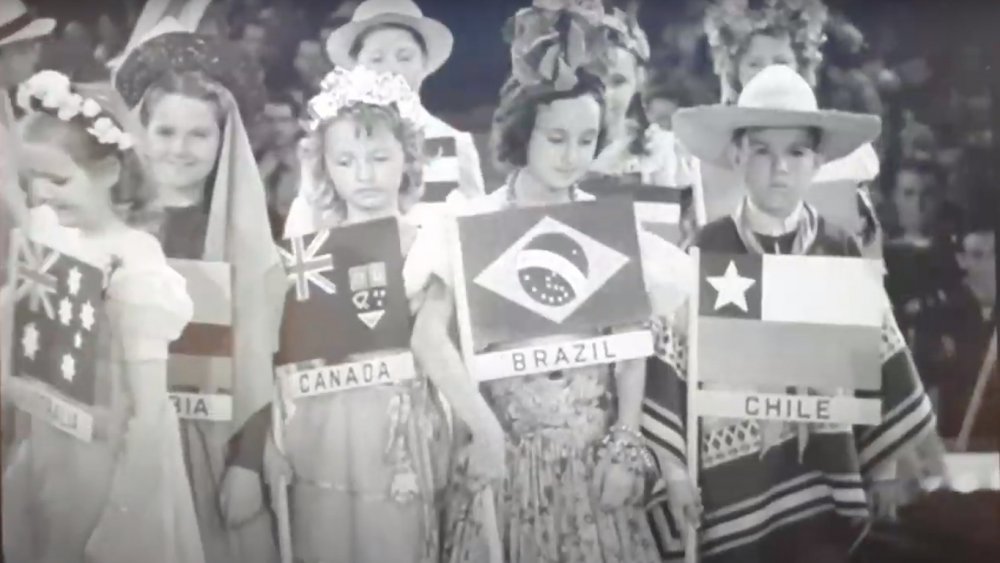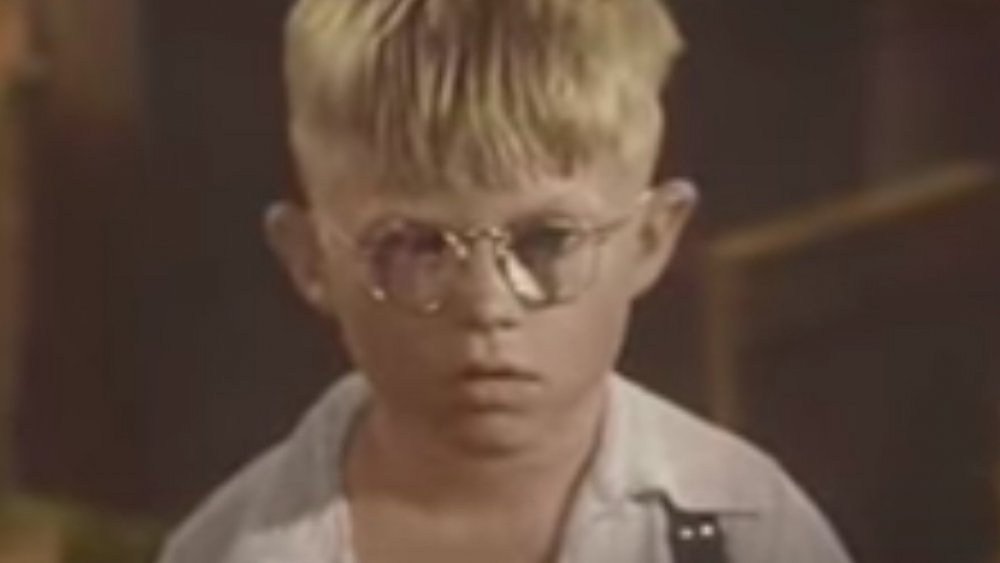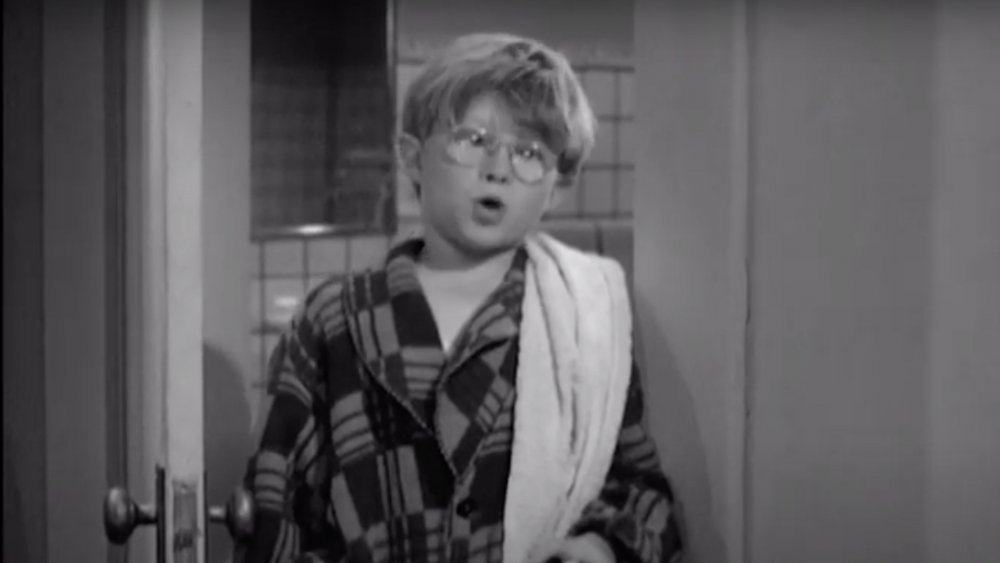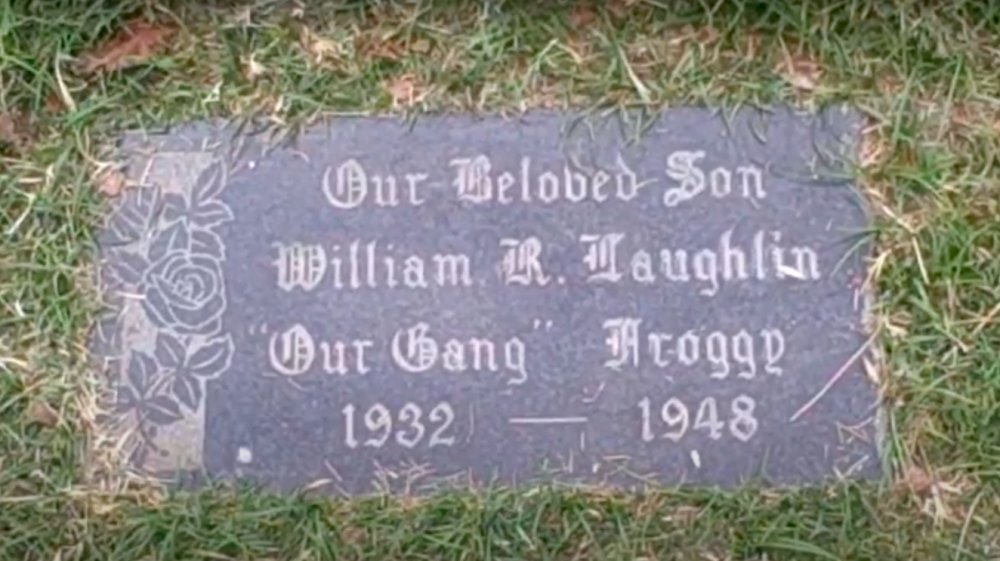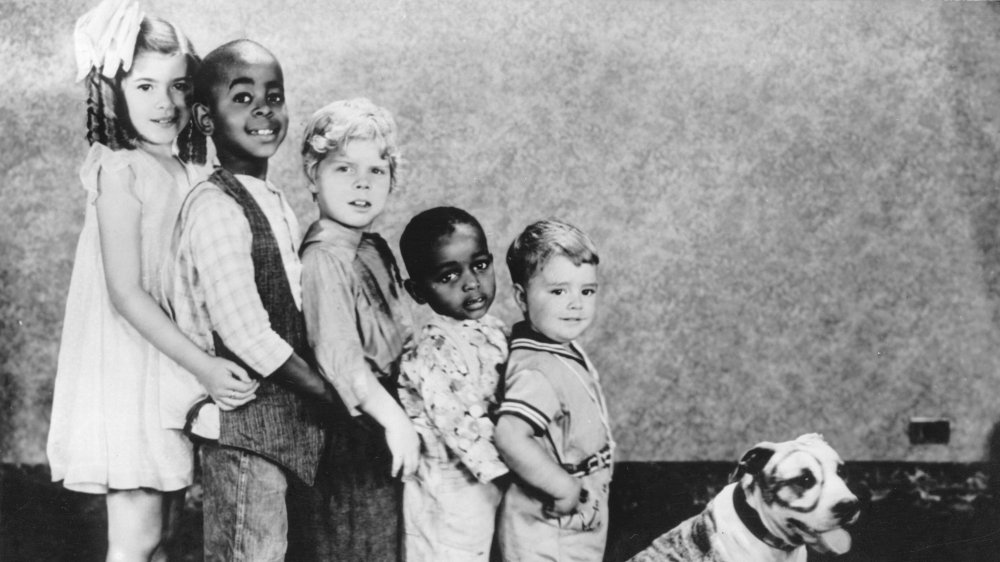The Tragic Real-Life Story Of Froggy From The Little Rascals
Even though it's been off the air for years, Our Gang or The Little Rascals holds a special place in many American's hearts. Created by Hal Roach in 1922, almost 200 short comedy films were made until MGM ended the series in 1944. Although there were some efforts to revive the series in the 1970s, Our Gang remained a quintessential product of the first half of the 20th century.
Despite appearing in Our Gang short films for only four years, one of the most memorable characters was Froggy, a cranky little boy with a croaking voice reminiscent of a frog. Played by Billy Laughlin, Froggy acted as the comic relief of the Our Gang shorts at the very end of the series' run. Although his time with the gang was short lived, Laughlin ended up acting for most of his life. Unfortunately, his life took a turn towards tragedy when he met an untimely end in 1948. As a result, Froggy became Billy Laughlin's greatest legacy. This is the tragic real-life story of Froggy from The Little Rascals.
Who was Billy Laughlin?
Froggy was played by William Robert "Billy" Laughlin, who was born on July 5th, 1932 in San Gabriel, California. He was the middle child of Charlotte C. Cruikshank and Robert Vine Laughlin, with an older brother named Tommy and a younger brother named Mikey. According to Alchetron, Laughlin was a beloved child with incredibly doting parents.
Billy Laughlin was born with strabismus, also known as crossed eyes, which is a condition in which one's eyes are unable to line up. Due to the strabismus, Laughlin wore strong, thick glasses in order to see and he was teased a great deal for his appearance by the neighborhood children. Because of all the teasing, Laughlin began to withdraw and become more and more timid.
According to Find a Grave, in an effort to raise Laughlin's self-esteem and give him a boost of confidence, his mother signed him up for drama classes. She also bought him a puppet from the American cartoon Popeye the Sailor and noticed that while he was playing with it, Laughlin would respond to himself with the gravely Popeye voice. It was this voice that ended up being his ticket to the silver screen.
What was Our Gang?
The Our Gang comedies were a series of shorts about a group of mischievous children, also called The Little Rascals. According to Travelanche, the series came into being with "Sunshine Sammy" Morrison, Harold Lloyd, and Snub Pollard, who starred in Hal Roach shorts in 1919. Roach was inspired to build a cast of characters around Morrison, so he recruited six more children and Our Gang was born. (The name The Little Rascals only came in 1950 for television syndication.)
Our Gang depicted impoverished children, who were often unclean and barefoot, reminiscent of Huck Finn and Tom Sawyer. Starting off in 1922 as silent short films, the series began using sound in 1929. According to NPR, the depiction of Black and white children playing together portrayed an idealized idea of what American race relations were like at the time. During the 1920s, it was the height of Jim Crow and the Ku Klux Klan was experiencing a revival, so it was a big deal to have children of different races playing together as though racism didn't affect them.
One of their first films from 1923 was called "Lodge Night," in which the gang makes fun of the Ku Klux Klan. This film in particular led to pushback from theater owners in the South and in regions where the KKK had a strong presence. But while Our Gang appeared progressive, it took a lot from minstrelsy, which allowed the show to walk a line between familiar stereotypes and radical messaging.
The New Pupil
By 1938, Hal Roach had left the production of Our Gang shorts and handed control over to MGM. As a result, the show became less rough and gritty, as it had before tried to represent the times of the Great Depression, and now instead tried to appeal to the sweetness and innocence of children.
During one of his drama classes, Billy Laughlin was overheard doing his Popeye voice by an MGM talent scout, who thought that Laughlin would make a great addition to this updated version of the shorts. After a test screen and a positive public reaction, who thought that Laughlin's gravelly voice was funny, he signed a term contract for Our Gang. At 7-years-old, Laughlin made his debut with the gang in 1940 in the short film "The New Pupil," directed by Edward L. Cahn.
According to Alchetron, in "The New Pupil," Billy Laughlin's character was named Harold, but his guttural voice quickly led to his renaming. Since the gang thought that their new member's voice sounded more like a frog than it did Popeye, they started calling him Froggy.
The froggy voice
Although there were suspicions that Billy Laughlin's "froggy" voice may have been dubbed, it was always really him doing the voice. And even though Laughlin was one of the main characters, his character Froggy was used sparingly in order to not overdo the gimmick of his vocal tones. According to chimesfreedom, a great example of this is in the short comedy film "Waldo's Last Stand," also directed by Edward L. Cahn.
In "Waldo's Last Stand," the gang decides to put on an elaborate show in order to help member Waldo attract people to his lemonade stand. However, they're only able to attract Froggy and even though he shows up, he refuses to buy a drink. The children attempt to convince him he wants lemonade, trying to coerce him through a song about dryness and thirst. When that doesn't work, they go so far as to put a heater under Froggy.
Even though Billy Laughlin shows up early in the episode, he doesn't speak until his punchline near the end of the short when he once more refuses to buy a glass of lemonade, stating "I don't have no money, and besides it's too hot in here." Eventually, the children realize that no one is coming to buy lemonade because all the children who would have are already involved in the production of the show.
The winding down of Our Gang films
Unfortunately for Billy Laughlin, he joined Our Gang when it was in its final stretch. Once Hal Roach gave Our Gang over to MGM, the quality of the show suffered immensely. While Hal Roach had wanted to simply make good comedy shorts that also portrayed the difficult world of the Great Depression, MGM tried to push a kids series that offered a mixture of morality plays and pep talks about American virtues. And since the films were being made during World War II, the shorts started to include American wartime propaganda and support for the conflict. As a result of declining audience interest, MGM ended up cancelling Our Gang in 1944.
Between 1940 and 1944, Billy Laughlin appeared in roughly 30 Our Gang short films. According to Find a Grave, during his four-year stint on Our Gang, Laughlin used his real voice only once in the 1941 film "1-2-3 Go!" Despite his sporadic appearances, Froggy's croaking voice made him an unforgettable fixture of Our Gang until its final short film "Dancing Romeo."
Dancing Romeo
The last Our Gang short film that Billy Laughlin appeared in was "Dancing Romeo" in 1944, but it wasn't just the end for him. According to Lord Heath, "Dancing Romeo" was the last ever Our Gang short film to be produced and released, bringing the series to an end after a run of 220 shorts.
Laughlin was at least able to go out with a bang since the final short centered around Froggy's infatuation with Marilyn, a dancer. Froggy is jealous that Marilyn is dancing with another boy, Gerald, and spends most of the film stewing over it. He ends up trying to put on his own dance recital in order to show Marilyn that he is a skilled dancer as well.But given his limited dance skills, Froggy makes sure that Mikey and Buckwheat can control his movements with hidden strings. When Gerald notices the cables, he cuts them and exposes Froggy's deception to everyone. But despite being embarrassingly outed, Froggy discovers that Marilyn likes him back! Stunned, Froggy exclaims "Gang! She loves me. Oh..." and promptly faints.
With this statement, Froggy utters in his classic croaking voice the very last line of the very last Our Gang short film.
Billy Laughlin's last acting gig
After MGM cancelled Our Gang in 1944, Billy Laughlin appeared in just one feature film before he decided to conclude his acting career. In 1944, Laughlin had a cameo in the movie Johnny Doesn't Live Here Any More. This movie was the only on-screen appearance Laughlin had outside of Our Gang.
In Johnny Doesn't Live Here Any More, a woman named Kathie Aumont moves into an apartment that has been vacated by a marine on duty. But the marine, Johnny, neglected to tell her that he'd given copies of his keys to several friends of his, resulting in a string of men coming into the apartment unannounced. One of these men is the young Billy Laughlin, who strolls into the apartment to take a shower and, upon discovering that his soap is missing, repeatedly exclaims "Someone stole my soap!" At 12-years-old, Laughlin once more acts as a comic relief character, and the actress Simone Simon can't help but giggle at Laughlin's commitment to the bit.
Even though Laughlin doesn't use his iconic Froggy voice, according to Mike's Take On The Movies, fans of Our Gang can easily recognize the raspy tones.
A tragic U-turn
After Our Gang ended and Billy Laughlin played his small part in Johnny Doesn't Live Here Any More, he auditioned for a few more roles before he decided he'd had enough and told his parents that he wanted to leave his acting career behind. According to Purple Clover, Laughlin left acting in order to have a normal adolescence and even took up a paper route.
Unfortunately, the young man's wish to have a normal adolescence ended up being tragically short-lived. On August 31st, 1948, while Billy Laughlin and his friend, John Wilband, were delivering newspapers on Laughlin's new motor scooter near La Puente, California, they were hit by a speeding truck while they were making a U-turn. According to Definition.org, Laughlin's parents had gifted the motor scooter to him just two weeks before the accident.
Wilband was in a coma for some time and fortunately survived with minor injuries, but at the age of 16, Laughlin became the youngest out of any of the other Our Gang actors to pass away. And according to Fleeing the Fates of the Little Rascals by Laura June Kenny, after his tragic death there were various imposters with unusual voices who tried to pass themselves off as Froggy over the years.
Tragic fates for other members of the Gang
Unfortunately, Billy Laughlin wasn't the only member of Our Gang to die young. Carl Dean Switzer, who played Alfalfa, died from a gunshot wound during an argument at the age of 31. And according to chimesfreedom, the altercation was over a mere $50. Additionally, Robert Hutchins, who played Weezer, died in an airplane accident during military training at the age of 19. And Norman Chaney, who played Chubby, also died young at the age of 22 after an operation.
After so many members of Our Gang succumbed to tragic fates, people began to think that there was some kind of curse afflicting the child actors. The actors William Thomas, Darla Hood, and Scotty Beckett all ended up dying before the age of 50. And even the dog, Pete the Pup, who appeared in a number of Our Gang films was reportedly poisoned in 1930. But according to Snopes, when all the Our Gang actors are considered, more than half lived to be at least 72 and over 75 percent reached their average life expectancy. While the percentages of those who died tragic deaths is slightly higher than what one might find in the general population, they still fall within reasonable expectations. While tragedy always stands out, thankfully the remaining Rascals don't have to live in fear of a curse around the corner.
